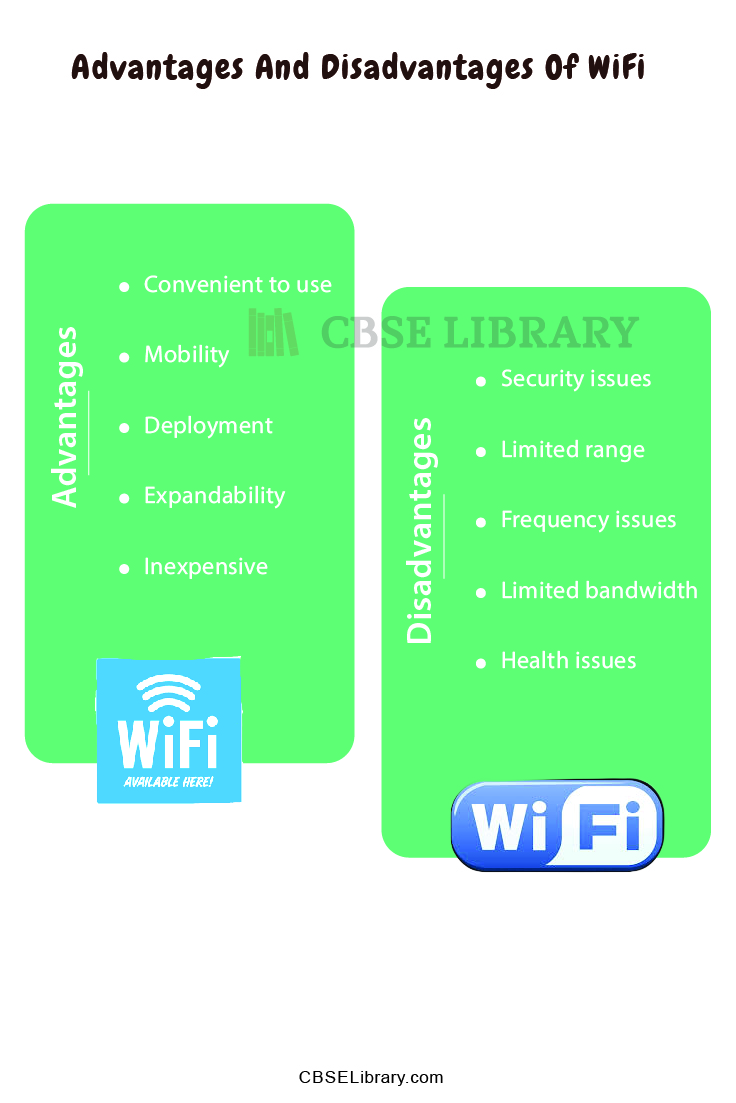Advantages And Disadvantages Of WiFi: WiFi is a wireless technology, a wireless router to be specific, that helps electronic gadgets like mobile phones, laptops, and television to get connected to the internet. It helps create a network through which we can share and gain information and knowledge. WiFi is a radio frequency sent by a router to the connected device. That device then converts the signal into data so that we can use it. Learn more about WiFi and its advantages and disadvantages below.
Students can also find more Advantages and Disadvantages articles on events, persons, sports, technology, and many more.
What is WiFi? Advantages and Disadvantages of WiFi
A WiFi network is not complex but a simple internet connection that can hold up the connections of multiple electronic devices through a router. Many broadband companies have launched their WiFi routers. This router is connected to the device and acts as a hub to provide internet access. WiFi has a specific range and provides you with speedy internet for the time you are in the network area. It is the wireless technology that has helped WiFi to expand its arms apart from offices and homes. Today we can find WiFi in our hostels, cafeterias, railway stations, and airports.
- Advantages of WiFi
- Disadvantages of WiFi
- Comparison Table for Advantages And Disadvantages Of Wifi
- FAQ’s on Advantages And Disadvantages Of WiFi
How does WiFi Work?
Wifi technology uses radio signals to channel the data from the router to the connected devices. The Wifi enabled devices like computers; laptops, mobile phones, printers, etc pick up the radio waves sent by the router. Consider the Wifi as a parcel. A parcel needs an address to be delivered. The devices act as a house with a proper address and a house number.
Similarly, the Wifi network needs a specific address and unique number to deliver the data to the right device. These radio waves sometimes become a matter of concern when you access the internet through a public router. Using the public router increases the chances of your device being hacked, or it may be caught under cyber attack. So it is highly recommended to use a Wifi that is password protected.
Best WiFi Network Providers in India
There are so many network providers at present in India but out of them, the following 5 are the best and have held a strong grip on the market. Let’s take a look at the best brands that provide you with the best of their network facility.
Airtel Xstreme Fiber: One of the best competitors in the market is airtel, which is also the leading telecom service provider in India. It has its services across over 100+ cities and is still spreading its area. Airtel Xstreme Fiber offers high-speed internet with unlimited data.
Reliance Jiofibre: Reliance Jiofibre is a global telecom company that provides internet facilities across many countries. There have to be 0 denials of the fact that Jio has helped every individual to enjoy the internet connection in every part of a state. Be it rural or urban, be it rich or the poor, Jio has made a great reach in terms of penetrating the market and binding their customers. It provides you with a starting plan of 300 rupees with super-speed internet.
BSNL: BSNL is the first and one of the oldest telecom service providers in India. Now they have too expanded themselves from just tele calling to the internet facility. Today, BSNL offers internet services through the ADSL routers with good speed and quality internet.
Asus: Asus was initially a mobile company that has now also entered the internet-providing niche. Asus provides the best quality wireless wifi routers. They can be used for many purposes, be it at home, office, gaming, business, etc.

Advantages of WiFi
Convenient to Use: Being wireless technology, it has become even more convenient to access the network from any available location at the primary network stimuli.
Mobile facility: The growth of public availability of wireless networks has increased over time. Earlier, it was considered to be a prestige issue, to have a wifi router at home, but with the increased digitalization now they can be spotted at the railway stations, airports, and cafeterias. They can be paid and used
Increased productivity: The affiliation quality of the wifi is way beyond the expectations. It is not bound to the parent network provider. It can connect to the desired network available at any place.
Deployment: The installation of the wireless network is comparatively easier than the wired one. Wifi facility has cut down the headaches of wires on all the walls.
Expandability: Good things always attract people. The comfort, wireless facility, and speedy network are all enough to attract the customers and choose the wireless wifi facility over the wired. It saves a lot of time for the hosts.
Inexpensive: The installation and the wiring part costs are cut to negligible when it comes to the wireless wifi installation. This is because most of the cost has to be spent on the wires and connectivity and its installation. Since a very less number of wires are used, it is advantageous to the company and the customer both.
Disadvantages of WiFi
Security issues: Even after several encryptions, the wifi facility is wireless in nature, it has become more vulnerable to hacking. This happens more commonly in public wifi facilities. The hackers maliciously introduce their network id. When these ids are used by the people, their information is accessible to the hackers, hence they can get trapped in the cheating.
Limited range: The range of wireless WiFi is sufficient for normal homely conditions. But if WiFi is installed at a point in a building then it may not be accessed by all the people in the building. Also at home, the widest range is between 30-35 meters. So you cannot use it beyond that.
Speed issues: No wonder the speed is the golden feather in the hat of Wifi but this high speed can be enjoyed only when a limited number of devices are connected to the WiFi. Whereas wired WiFi allows the solid speed to as many devices connected.
Frequencies issues: You might have noticed the hindered network, or the slower speed all of a sudden and then back to normal. This happens because the frequency of the WiFi network is 2.4GHz. Due to this, it may get hindered by electromagnetic waves.
Limited Bandwidth: The normal WiFi allows the connections to up to 30 devices. Soon after you start to increase the number of devices, the weaker will be the strength of WiFi.
Health issues: Since the WiFi emitted electromagnetic waves, it creates serious health issues that may lead to deadly diseases like cancer and insomnia.

Comparison Table for Advantages And Disadvantages Of Wifi
Increased productivity Speed issues
| Advantages | Disadvantages |
| Convenient to use | Security issues |
| Mobility | Limited range |
| Deployment | Frequency issues |
| Expandability | Limited bandwidth |
| Inexpensive | Health issues |
FAQ’s on Advantages And Disadvantages Of WiFi
Question 1.
What will be the installation cost of wifi at home?
Answer:
installation of WiFi at home is not much costly. Neither you need to get a landline connection. Simple installation costs you 500-2000 rupees, depending on the operator you choose.
Question 2.
What is an ISP?
Answer:
ISP stands for the Internet Service Provider. It helps to provide direct access to the internet at any place of work.
Question 3.
What is the difference between WiFi and Hotspot?
Answer:
WiFI provides the internet by the ISP and can be used when paid. Whereas Hotspots can be provided by any company, hotel, or even a single mobile phone and needs no kind of payment.
